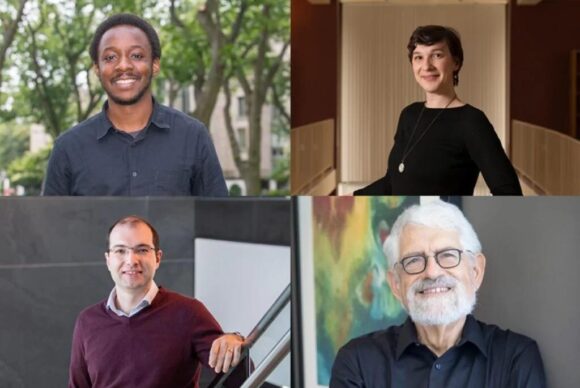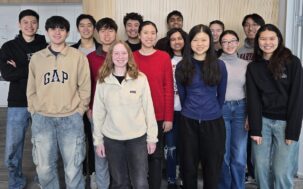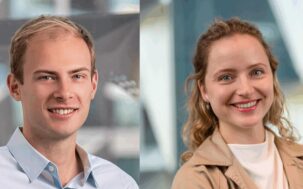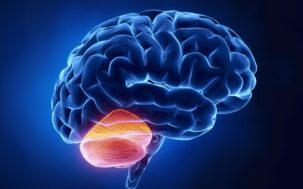Kempner Institute Names Four Pioneering Research Scientists as Associate Faculty
Four Harvard faculty members representing a diversity of backgrounds and expertise appointed to study the basis of intelligence in natural and artificial systems

Kempner Institute’s newly appointed associate faculty, clockwise from left, Demba Ba, Talia Konkle, Haim Sompolinsky and Cengiz Pehlevan. (Konkle and Pehlevan images courtesy of Anna Olivella and the Harvard Brain Science Initiative)
CAMBRIDGE, MA — The Kempner Institute for the Study of Natural and Artificial Intelligence at Harvard announced the appointment of Demba Ba, Talia Konkle, Cengiz Pehlevan, and Haim Sompolinsky as the Institute’s inaugural cohort of associate faculty.
The newly appointed associate faculty, who will help shape the Kempner Institute’s educational and research priorities, will begin their three-year terms on July 1.
All four appointees are current Harvard faculty members whose pioneering research advances the Kempner Institute’s scientific mission – investigating critical research questions at the intersection of natural and artificial intelligence.
Demba Ba, Associate Professor of Electrical Engineering and Bioengineering, studies signal processing— the way that biological systems represent and encode information from the world to learn, make choices, and accomplish goals. Ba uses recordings of neural activity to better understand the structure and function of neural networks, and applies those insights within both natural and artificial contexts. By studying how the brain learns and how artificial neural networks replicate the way the brain processes information, Ba aims to improve the design and efficiency of AI tools used in medicine and science.
Talia Konkle, Professor, Department of Psychology, Center for Brain Science, researches the cognitive and neural organization of high-level visual experience to understand how humans perceive and understand the visual world around them. Her work bridges disciplines, elucidating the principles governing brain organization and learning (neuroscience), the formats and algorithms underlying our perceptual intelligence (psychology), and the principles that govern representation learning in large-scale artificially intelligent systems (computer science).
Cengiz Pehlevan, Assistant Professor of Applied Mathematics, studies how networks of neurons compute and learn in both natural and artificial contexts. Pehlevan builds mathematical and computational models to study how the brain learns, remembers, and makes decisions. He develops theoretical methods to understand deep neural networks of practical relevance.
Haim Sompolinsky is Professor in Residence, Harvard Department of Molecular and Cellular Biology and Physics, and Director of Harvard’s Swartz Program in Theoretical Neuroscience in the Center for Brain Science. He seeks to uncover the fundamental principles of the organization, dynamics and function of the brain, viewing the brain through multiscale lenses, spanning the molecular, the cellular, and the circuit levels. His current research leverages recent advances in artificial intelligence and deep networks to shed light on fundamental principles underlying higher cognitive brain functions, including categorization, concept learning, and reasoning.
About the Kempner Institute
The Kempner Institute seeks to better understand the basis of intelligence in natural and artificial systems by recruiting and training future generations of researchers to study intelligence from biological, cognitive, engineering, and computational perspectives. Its bold premise is that the fields of natural and artificial intelligence are intimately interconnected; the next generation of artificial intelligence (AI) will require the same principles that our brains use for fast, flexible natural reasoning, and understanding how our brains compute and reason can be elucidated by theories developed for AI. Join the Kempner mailing list to learn more, and to receive updates and news.
PRESS CONTACT:
Deborah Apsel Lang | (617) 495-7993 | deborah_apsel_lang@harvard.edu






